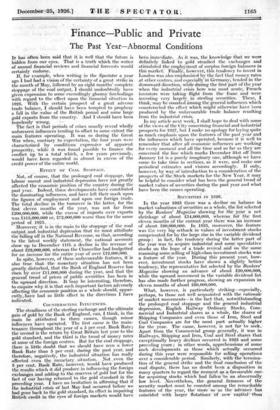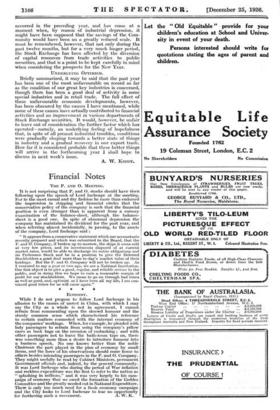Finance—Public and Private
The Past Year—Abnormal Conditions
IT has often been said that it- is Well that the future is hidden from our eyes. That is a truth which the .writer of annual financial reviews and financial forecasts would certainly endorse. If, for example, when writing in the Spectator a year ago I had had a vision of the certainty of a great strike in the month of May, followed by an eight months' complete stoppage of the coal output, I should undoubtedly have given expression to some exceedingly gloomy forebodings with regard to the effect upon the financial situation in 1926. - With the certain prospect of a great adverse trade balance, I should have been tempted to prophesy a fall in the value of the British pound and some large gold exports from the country. And I should have been hopelessly wrong. The fact is that periods of crises usually reveal wholly unforeseen influences tending to offset to some extent the main features operating. It was so during the Great War when, contrary ,to expectation, the four years were characterized by conditions expressive of apparent prosperity, while it was found possible to finance the conflict up to a total which, a few years- previously, would have been regarded as almost in .excess of the credit power of the entire world.
EFFECT OF COAL STOPPAGE.
Not, of course, that the prolonged coal stoppage, the labour unrest and industrial depression have not greatly affected the economic ,position of the country during the Past year. Indeed, those developments have, constituted the dominating influences, and have left their mark upon the figures of employment -and upon. our foreign trade. The total decline in the turnover in the latter, for the first eleven months of the year, was not far from £200,000,000, while the excess of imports over exports was £418,000,000 or, £72,000,000 worse than for the same period of 1925. - - . - - - . — • Moreover,---it is in the main to the stoppage of the coal output_ and_ industrial depression that we must .attribute the falling off in the National Revenue, so that,-according to the latest weekly statement, the national accounts show up to December 11th a decline in the revenue of about 128,000,000,.whereas the Chancellor had-budgetted for an increase for the entire .year of over £12,000,000. In spite, however, of these-unfavonrable feature's, it' is also: true- that . the- monetary situation has not been greatly. disturbed, that the Bank of England Reserve has risen by over £11,000,000 during the year, and that the general trend of prices of public securities has been in the•upWard direction. It tray be interesting, therefore, to enquire why it is that such important factors adversely affecting the economic position as a whole should, appar- ently, Have had so little effect in the directions I have indicated: COUNTERACTING INFLUENCES.
The steadiness of the sterling exchange and the ultimate gain of gold by the Bank of England, cMi, I think, in the main be attributed to three causes, though minor influences have operated: ' The first cause is the main- tenance throughout the year of a 5 per cent. Bank' Rate; the second -is the return by Great Britain last year to-the gold standard, and the third is the trend of money rates at some of the foreign centres. But for the coal stoppage, there is-little• doubt that we should have seen a lower Bank Rate than 5 percent: during the past year, and therefore, negatively, the industrial situation has really -affected even the _monetary - situation._ Not even- the 5 per cent. Bank Rate,. however, would have produced the results which it did produce in influencing the foreign exchanges and adding to the ,reserves of gold but for the fact of our having returned to the gold- standard in the preceding year. I have no hesitation in affirming that if the industrial crisis of last May had- occurred before we had gone back to the gold standard, its effect in impairing British credit in the eyes of foreign markets would have been,ininiediate. As it was, the knowledge that we were . . definitely linked 'Id:gold steadied the exchanges and stiMulated the employment of surplus foreign balances in this market. Finally, however", this tendency to invest in London was alsnemphasiied by the.fact that money. rates at other centres, and especially in Germany, tended in the downward direction, while during the first part Of the year when the industrial crisis here was most acute, 'French investors were taking flighf.from thes franc and were investing very largely. in sterling, securities. These, I think; may be eimlited among thegeneral influences which counteracted the effect which might otherwise have seen produced by the unfavourable trade balance resulting from the industrial crisis.
In my article next week, I shall hope to deal with some of the views of the City concerning financial and industrial prospects for 1927, but I make no apology for laying quite as much emphasis upon the features of the past year and the influences which have operated, because it is well to remember that after all economic influences are working . for every moment and all the time and so far as they are concerned the line which marks December 81it off from January 1st is a purely imaginary one,- although we have come to take time in sections, as it were, and make our periodical estimates and visions accordingly. If only, however, by way of introduction to a consideration of the prospects of the:Stock markets for the New Year, it may be helpful to consider what has been the general trend of market values of securities during the past year and what have been the causes operating.. .
SECURITIES IN 1926.
In the year 1925 there was a decline on balance in market valuations of securities as a whole, the list selected by the Bankers' Magazine showing for the year a net shrinkage of about £54,000,000, whereas' for the first eleven months of the current year there Was :an increase of about_ 10,606,060. In 1925, moreover, the feature was the very big setback in-values of investment stocks compehsated far by the•largerise in the variable dividend group : in fact,' the tendency during the latter part of the year was tb acquire industrial and some speculative stocks on the hope of a trade revival and' on the, same reasoning some ,selling of high-class investment stocks was a feature of the year. During this present year, how- ever, investment stocks have shown a slightly better tendency, the representative list selected by the Bankers' Magazine showing an advance of about £20,000,000, while the upward movement in the variable dividend list has also made further progress, showing an expansion in eleven months of about £60,000,000.
What, however, is particularly striking—especially, perhaps, to those not well acquainted with the rationale of market movements—is the fact that, notwithstanding the prolonged coal stoppage and the general industrial depression, English Railway Ordinary Stocks, Com- mercial and Industrial shares as a whole, the shares of Shipping Companies and even those of Iron, Steel and Coal Companies are for the most - part actually higher for the year. The cause, however, is not far to seek. Apart from the Commercial group generally, it was in Railways, Shipping and Iron, Coal and Steel shares that exceptionally heavy declines occurred in 1925 and some preceding years ; in other words, apprehensions of some such developments as those which actually occurred during this year were responsible for selling operations over a considerable period. Similarly, with the termina- tion of the general strike and the final conclusion of the coal dispute, there has no doubt been a disposition in many quarters to regard the moment as afavourable one. for acquiring stocks which had fallen 'to an abnormally low level. Nevertheless, the general firmness of the security market must be counted among the remarkable features" of the year, the' more so as the advance has coincided with larger flotations of new tatfital, than occurred in the preceding year, and has come at a moment when, by reason of industrial depression, it might have been supposed that the savings of the Com- munity would have been on a greatly reduced scale. It must be remembered, however, that not only during the past twelve months, but for a very much longer period, the Stock Exchange has been affected by the diversion of capital resources from trade activities to public securities, and that is a point to be kept carefully in mind when considering the prospects for the New Year.
UNDERLYING OPTIMISM.
Briefly summarized, it may be said that the past year has been one of the most unfavourable on record so far as the condition of our great key industries is concerned, though there has been a good deal of activity in some special industries and in retail trade. The full effect of these unfavourable economic developments, however, has been obscured by the causes I have mentioned, while some of these causes have actually contributed to financial activities and an improvement in various departments of Stock Exchange securities. It would, however, be unfair to leave out of consideration the further factor which has operated—namely, an underlying feeling of hopefulness that, in spite of all present industrial troubles, conditions were gradually shaping towards a better state of things in industry and a gradual recovery in our export trade. How far it is considered probable that these better things will arrive in the forthcoming year I shall hope to discuss in next week's issue.
A. W. KIDDY.



































 Previous page
Previous page